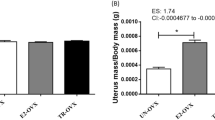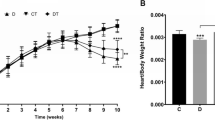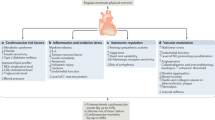Abstract
Purpose: This study examined the effects of an 8-week androgen deprivation therapy treatment using Zoladex and an endurance training regimen on cardiac function.
Methods: Male Sprague–Dawley rats received either Zoladex or placebo. Animals remained sedentary or endurance trained during the drug treatment period. On day 57, ex vivo cardiac function was analyzed.
Results: Hearts from sedentary animals receiving Zoladex possessed significant cardiac dysfunction. However, hearts from exercise trained rats receiving Zoladex possessed cardiac function values similar to those from hearts from placebo animals.
Conclusions: An 8-week treatment with Zoladex promoted cardiac dysfunction. Endurance training during Zoladex treatment protected against this cardiac dysfunction.
This is a preview of subscription content, access via your institution
Access options
Subscribe to this journal
Receive 4 print issues and online access
$259.00 per year
only $64.75 per issue
Buy this article
- Purchase on Springer Link
- Instant access to full article PDF
Prices may be subject to local taxes which are calculated during checkout



Similar content being viewed by others
References
Labrie F, Cusan L, Gomez JL, Diamond P, Candas B . Combination of screening and preoperative endocrine therapy: the potential for an important decrease in prostate cancer mortality. J Clin Endocrinol Metab 1995; 80: 2002–2012.
Härkönen P, Törn S, Kurkela R, Povari K, Pulkka A, Lindfors A et al. Sex hormone metabolism in prostate cancer cells during transition to an androgen-independent state. J Clin Endocrinol Metab 2003; 88: 705–712.
Rashid MH, Chaudary UB . Intermittent androgen deprivation therapy for prostate cancer. Oncologist 2004; 9: 295–301.
Furr BJ . Pharmacology of the leuteinizing-releasing hormone (LHRH) analogue, Zoladex. Horm Res 1989; 32: S86–S92.
Higano CS . Side effects of androgen deprivation therapy: monitoring and minimizing toxicities. Urology 2003; 61: S32–S38.
Chen AC, Petrylak DP . Complications of androgen-deprivation therapy in men with prostate cancer. Current Urol Rep 2005; 6: 210–216.
Saad F, Olsson C, Schulman CC . Skeletal morbidity in men with prostate cancer: quality-of-life considerations throughout the continuum of care. Eur Urol 2004; 46: 731–739.
Scheuer J, Malhotra A, Capasso J . Effetcs of gonadectomy and hormonal replacement on rat hearts. Circ Res 1987; 61: 12–19.
Jin H et al. Effects of exercise training on cardiac function, gene expression, and apoptosis in rats. Am J Physiol 2002; 279: H2994–H3002.
Stolen KQ, Kemppainen J, Ukkonen H, Kalliokosi KK, Luotolahti M, Hämäläinen H et al. Exercise training improves biventricular oxidative metabolism and left ventricular efficiency inpatients with dilated cardiomyopathy. J Am Coll Cardiol 2003; 41: 460–467.
Chicco AJ, Hydock DS, Schneider CM, Hayward R . Low-intensity exercise training during doxorubicin treatment protects against cardiotoxicity. J Appl Physiol 2006; 100: 519–527.
Chicco AJ, Schneider CM, Hayward R . Voluntary exercise protects against acute doxorubicin cardiotoxicity in the isolated perfused rat heart. Am J Physiol 2005; 289: R424–R431.
Talmadge RJ, Roy RR . Electrophoretic separation of rat skeletal muscle myosin heavy-chain isoforms. J Appl Physiol 1993; 75: 2337–2340.
Marsh JD, Lehmann MH, Ritchie RH, Gwathmey JK, Green GE, Schiebinger RJ . Androgen receptors mediate hypertrophy in cardiac myocytes. Circulation 1998; 98: 256–261.
Golden KL, Marsh JD, Jiang Y, Brown T, Moulden J . Gonadectomy of adult male rats reduces contractility of isolated cardiac myocytes. Am J Physiol 2003; 285: E449–E453.
Golden KL, Marsh JD, Jiang Y, Moulden J . Gonadectomy alters myosin heavy chain composition in isolated cardiac myocytes. Endocrine 2004; 24: 137–140.
Malhotra A, Buttrick P, Sheuer J . Effects of sex hormones on development of physiological and pathological cardiac hypertrophy in male and female rats. Am J Physiol 1990; 259: H866–H871.
Rosenkratz-Weiss P, Tomek RJ, Mathew J, Eghbali M . Gender-specific differences in expression of mRNAs for functional and structural proteins in rat ventricular myocardium. J Mol Cell Cardiol 1994; 26: 261–270.
Herron T J, McDonald KS . Small amounts of α-myosin heavy chain isoform expression significantly increase power output of rat cardiac myocyte fragments. Circ Res 2002; 90: 1150–1152.
Herron TJ, Korte FS, McDonald KS . Loaded shortening and power output in cardiac myocytes are dependent on myosin heavy chain isoform expression. Am J Physiol 2001; 281: H1217–H1222.
Korte FS, Herron TJ, Rovetto MJ, McDonald KS . Power output is linearly related to myosin heavy chain content in rat skinned myocytes and isolated working hearts. Am J Physiol 2005; 289: H801–H812.
Tardiff JC, Hewett TE, Factor SM, Vikstrom KL, Robbins J, Leinwand LA . Expression of the β (slow)-isoform of MHC in the adult mouse heart causes dominant-negative functional effects. Am J Physiol 2000; 278: H412–H419.
Golden KL, Marsh JD, Jiang Y, Moulden J . Acute actions of testosterone on contractile function of isolated rat ventricular myocytes. Eur J Endocrinol 2005; 152: 479–483.
Lin AL, Gonzalez R, Shain SA . Androgen directs apparent cytoplasmic and nuclear distribution of rat cardiovascular androgen receptors. Arteriosclerosis 1985; 5: 659–667.
Haddad F, Masatsuga M, Bodell PW, Quin A, McCue A, Baldwin KM . Role of thyroid hormone and insulin in control of cardiac isomyosin expression. J Mol Cell Cardiol 1997; 29: 559–569.
Christianson D, Roti E, Vagenakis AG, Braverman LE . The sex-related difference in serum thyrotropin concentration is androgen mediated. Endocrinology 1981; 108: 529–535.
Katzeff HL, Bovbjerg D, Mark DA . Exercise regulation of triiodothyronine metabolism. Am J Physiol 1988; 255: E824–E828.
Iemitsu M, Miyauchi T, Maeda S, Tanabe T, Takanashi M, Matsuda M et al. Exercise training improves cardiac function-related gene levels through thyroid hormone receptor signaling in aged rats. Am J Physiol 2004; 286: H1696–H1705.
Kinugawa K, Yonekura K, Ribeiro RC, Eto Y, Aoyagi T, Baxter JD et al. Regulation of thyroid hormone receptor isoforms in physiological and pathological cardiac hypertrophy. Circ Res 2001; 89: 591–598.
Diffee GM, Seversen EA, Titus MM . Exercise training increases the Ca2+ sensitivity of tension in rat cardiac myocytes. J Appl Physiol 2001; 91: 309–315.
Zabka AG, Mitchell GS, Behan M . Ageing and gonadectomy have similar effects on hypoglossal long-term facilitation in male Fischer rats. J Physiol 2005; 563: 557–568.
Acknowledgements
Support source: AstraZeneca (Macclesfield, Cheshire, UK) supplied the drug samples for this study.
Author information
Authors and Affiliations
Corresponding author
Rights and permissions
About this article
Cite this article
Hydock, D., Wonders, K., Schneider, C. et al. Androgen deprivation therapy and cardiac function: effects of endurance training. Prostate Cancer Prostatic Dis 9, 392–398 (2006). https://doi.org/10.1038/sj.pcan.4500890
Received:
Revised:
Accepted:
Published:
Issue Date:
DOI: https://doi.org/10.1038/sj.pcan.4500890
Keywords
This article is cited by
-
Effects of recreational soccer in men with prostate cancer undergoing androgen deprivation therapy: study protocol for the ‘FC Prostate’ randomized controlled trial
BMC Cancer (2013)
-
Effects of endurance training on combined goserelin acetate and doxorubicin treatment–induced cardiac dysfunction
Cancer Chemotherapy and Pharmacology (2011)
-
Cardiovascular and metabolic complications during androgen deprivation: exercise as a potential countermeasure
Prostate Cancer and Prostatic Diseases (2009)



